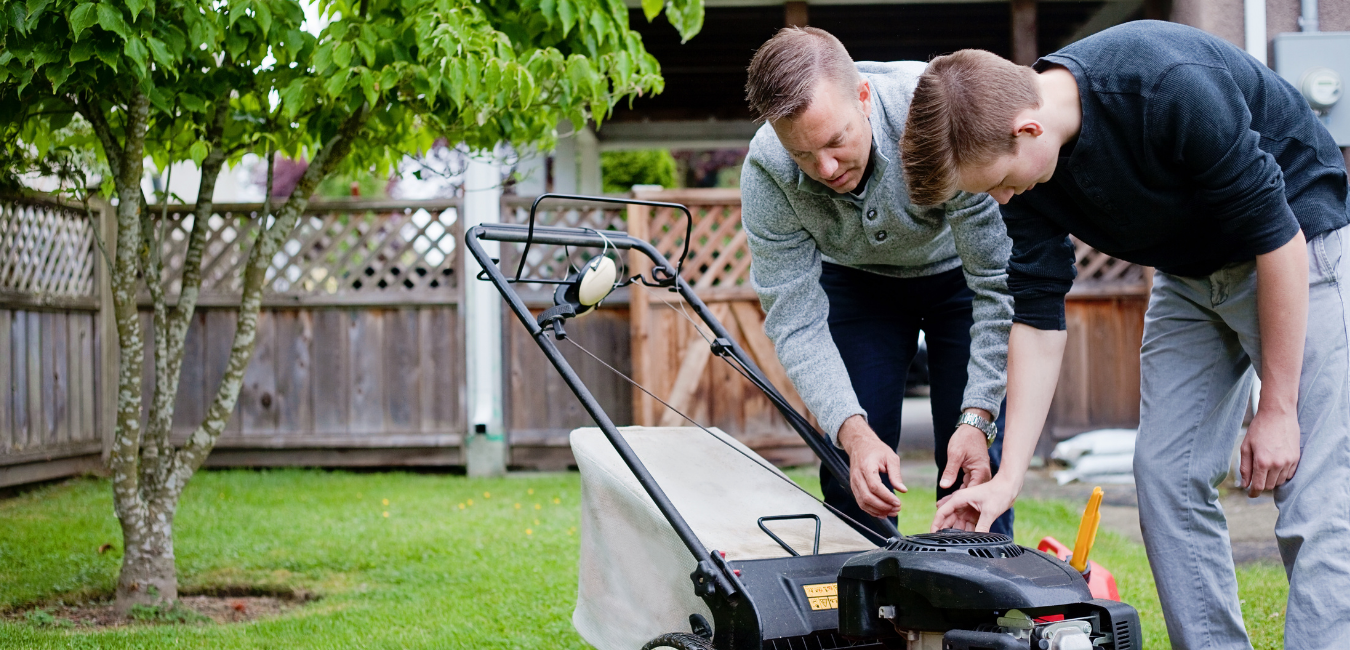Could Dad Have Noise-Induced Hearing Loss?
You know, Dads are multi-talented kinds of guys. They like to make things, build things or fix things, and often you can find them playing with their power tools, listening to their favorite album at full volume, or attending a sporting event.
What do all these have in common? These are all loud noises that elevate the risk of noise-induced hearing loss.
When was the last time Dad completed a hearing test? There are many ways to protect Dad’s hearing, but first you should encourage Dad to complete a hearing test to understand his level of hearing health. Dad plays a very important role in our lives, and we want him to stay connected to his family and friends for many years to come. If he struggles with hearing loss, it may make celebrating Father’s Day a little tricky so we want to ensure that he is included in all of the day’s fun activities.
First, Identify His Noise Exposure
As we all know, not all Dads are the same. This doesn’t mean that any Dad is better than the other (though they’ll surely argue about that point), but they don’t all have the same professional or recreational pursuits. Their noise exposure will vary quite a bit.
For instance, one Dad might work in the office, then ride his motorcycle home. Another Dad might work at the factory or construction site, then drive home in a nice, quiet car.
One might go shooting at the range for fun, while another might head to the arena to catch a game, and a third might head to a concert. And, of course, a fourth might work at that concert. There are hundreds of other scenarios, each with its own, unique noise exposure.
Following is a list of activities and the noise levels they produce, in decibels. Any noise that is over 85 decibels (dB) can damage Dad’s hearing. Work activities, as well as many common recreational activities, can be louder than that 85 dB threshold [1]:
Activities that are between 85dB and 120dB are dangerously loud:
- Motorboats (85dB – 115dB)
- Lawn mowers (90dB)
- Belt sanders (93dB)
- Snow mobiles (99dB)
- Motorcycles (105dB)
- Bulldozers (105dB)
- Chainsaws (110dB)
- Video arcades (110dB)
- Personal listening devices with headphones (105dB – 120dB)
- Movie theaters (118dB)
- Jackhammers (120dB)
- Health clubs and aerobic studios (120dB)
Activities that are over 120dB are extremely dangerous:
- Live music concerts (120dB and louder)
- Sporting events (117dB – 139dB)
- Firecrackers at an average distance of 10 feet (125dB – 155dB)
- Airplanes taking off (140 dB)
- Gunshots (160dB – 170dB)
Second, Sit Down and Talk to Dad
The first and most important thing to do is ask Dad if he realizes just how loud his environment is. Most modern industrial or construction workplaces require hearing protection, but that doesn’t mean they all do or the hearing protection was fitted and used properly. And, if Dad works in an office, workplace hearing protection may not matter, but the level of sound on head phones for long hours can also be a concern.
Aside from his workplace, his recreational activities may be extremely loud, and that includes his domestic work, like running the lawnmower, a weed wacker or a chainsaw.
Like any warm-blooded man, Dad will assure you that he’s perfectly fine, no matter how loud his activities are. So, enter the conversation armed with your smartphone and one of the various decibel meters that are available. Offer to join him on a field test, to see how loud his yard tools are.
The goal, of course, will be to show him how loud everything is. When he realizes how dangerous some of the noise levels are, it is a great idea to then talk to him about professional custom ear moulds that can help to filter out the damaging loud noises.
Third, Mention the Effects of Hearing Loss
Hearing loss develops gradually, over the span of years, so it may not become noticeable right away. But, as hearing loss slowly advances, the inability to hear speech can lead to social isolation, because asking others to repeat what they say can be embarrassing. This can lead Dad to become withdrawn and, if he enjoys the company of others, even angry and depressed. [2]
What is worse is that hearing loss will go untreated for years, precisely because of its slow onset. Untreated hearing loss can lead to cognitive decline and dementia. [3] Dad can start by taking an online hearing test, or making an appointment for a free no-obligation hearing test with one of our hearing health care professionals.
People with untreated hearing loss often have a hard time advancing in the workplace or finding better jobs, perhaps because of the diminishing ability to communicate. With the lacking ability to hear, someone who was socially outgoing may become more withdrawn and more accepting of “his place,” rather than forging ahead for the next promotion or the next boost to his career. [4]
So, What’s the Solution?
Booking a hearing test is the first step in the right direction. If the results indicate that Dad has hearing loss, our hearing healthcare professionals will show him the best options to help meet his personal preferences, lifestyle and budget. There are many discreet hearing aid options available, and many even offer advanced features such as rechargeable technology, Bluetooth connectivity, and more!
If Dad has good hearing, our clinicians can advise and fit him for custom ear moulds to keep his ears protected while enjoying his favourite activities, or to wear while at his place of work.
The key is to keep him connected to the world of sound for many years to come, as there is nothing more special than a bond with Dad.
Citation
[1] Recreational Noise | Hearing Center of Excellence (https://hearing.health.mil/Prevention/Dangers-of-Loud-Noise/Recreational-Noise)
[2] Trychin, S. (1993). Communication issues related to hearing loss. Gallaudet University.
[3] Granick, Kleban, & Weiss, 1976; Gussekloo, de Craen, Oduber, van Boxtel, & Westendorp, 2005; Lin et al., 2011a; Lin et al., 2011b; McCoy et al., 2005; Valentijn et al., 2005 economic
[4] Dalton, D. S., Cruickshanks, K. J., Klein, B. E., Klein, R., Wiley, T. L., & Nondahl, D. M. (2003). The impact of hearing loss on quality of life in older adults. The gerontologist, 43(5), 661-668







